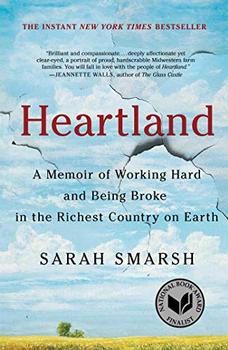Summary | Excerpt | Reading Guide | Reviews | Beyond the Book | Readalikes | Genres & Themes | Author Bio

Critics' Opinion:
Readers' Opinion:
First Published:
Sep 2018, 304 pages
Paperback:
Sep 2019, 304 pages
 Book Reviewed by:
Book Reviewed by:
Rebecca Renner
Buy This Book
I started to wake up to the gulf between my origins and the seats of American power when I left home at eighteen. Something about my family was peculiar and willfully ignored in the modern story of our country. My best attempt at explaining it was, "I grew up on a farm." But it was much more than that. It was income, culture, access, language, work, education, food—the stuff of life itself.
The middle-class-white stories we read in the news and saw in movies might as well have taken place on Mars. We lived, worked, and shopped among people whose race and ethnicity were different from ours, but we didn't know any "rich people." We scarcely knew anyone who was truly "middle class."
We were "below the poverty line," I'd later understand—distasteful to better-off whites, I think, for having failed economically in the context of their own race. And we were of a place, the Great Plains, spurned by more powerful corners of the country as a monolithic cultural wasteland. "Flyover country," people called it, like walking there might be dangerous. Its people were "backward," "rednecks." Maybe even "trash."
Somehow, without yet understanding any of that consciously, I picked for you a name about dignity and respect. I used to say it over and over in my head, the way some girls wrote boys' names in notebooks. I never even pictured a father for you—knowing on some level, I guess, that you wouldn't need one. I pictured only you. I knew how to say your name: Grandpa Arnie's middle name and the month I was born. A wealthy month for wheat farmers. August.
* * *
Betty was sixteen when she got pregnant with Jeannie. If I had to pick a fact of our family history that most shaped my relationship to you, it would probably be that one: Every woman who helped raise me, on my mom's side of the family, had been a teenage mother who brought a baby into a dangerous place.
The father of Betty's baby was a twenty-year-old Wichita street thug named Ray, whom she'd known since they were kids together on the bad side of town. I met this biological grandfather of mine only once, and he looked just like everyone had said—like a gangster. He had black hair, slicked back, and wore a suit. He usually had a look on his face that Grandma described as "arrogant."
Ray was the opposite of Grandpa Arnie. He routinely hit Betty, pinned her down, punched her. She would fight back until he knocked her unconscious or kicked her in the ribs and left her bruised and bleeding.
Betty knew Ray could murder her. So when Jeannie was just a few months old, she decided to get out of Wichita for both of their sakes. She would need money to do it. She couldn't ask her mom, Dorothy, for help; they were fighting, and Dorothy didn't have a dime to spare anyway. She asked her grandparents across the street, Dorothy's parents, to lend her $75, the cost of a divorce at the county courthouse. They told her, "You made your bed, now you lay in it." Betty told herself that if someday, somehow, she ended up in a position to help somebody in a bind, she would do it, without judgment.
She came up with twenty-five bucks, went to the public car auction, and bought an old Plymouth. Or maybe it was a Dodge. Her sister Pud helped her spray-paint it black in their mother's driveway so it wouldn't look so rusty and awful. Whether she could afford a divorce or not, she was leaving town.
"I packed my car with what little shit I had, and my baby, and I took off," Betty told me. "And I had no idea where in the hell I was going. Chicago's where I stopped."
Every kid in our family moved more times than they could remember without getting out a pen and notepad. If you're wild enough to enjoy it, poverty can contain a sort of freedom—no careers or properties to maintain, no community meetings or social status to be responsible to. If there was a car that ran and a bit of gas money, we could just leave. Like my grandmother and my mother, you and I probably would have done a lot of that sort of rambling together.
Excerpted from Heartland by Sarah Smarsh. Copyright © 2018 by Sarah Smarsh. Excerpted by permission of Scribner. All rights reserved. No part of this excerpt may be reproduced or reprinted without permission in writing from the publisher.





The Funeral Cryer by Wenyan Lu
Debut novelist Wenyan Lu brings us this witty yet profound story about one woman's midlife reawakening in contemporary rural China.
Your guide toexceptional books
BookBrowse seeks out and recommends the best in contemporary fiction and nonfiction—books that not only engage and entertain but also deepen our understanding of ourselves and the world around us.